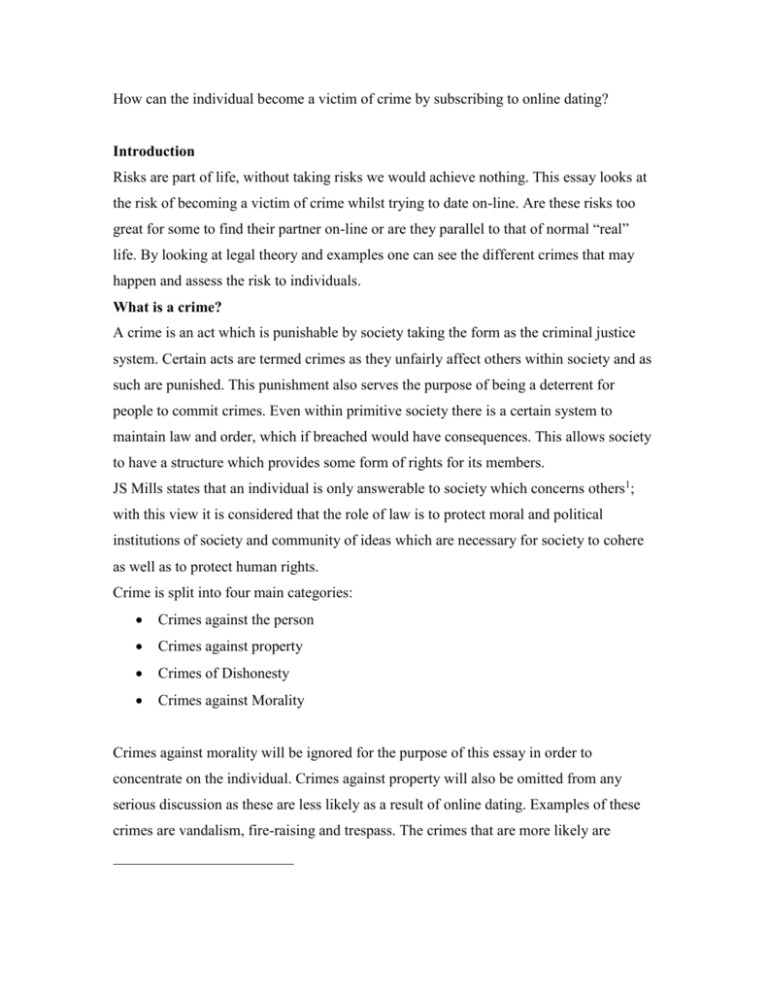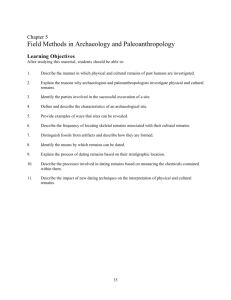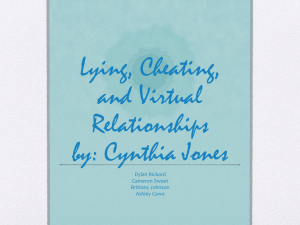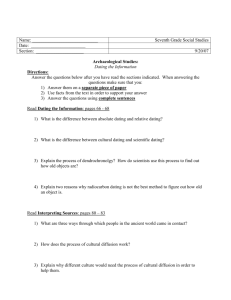
How can the individual become a victim of crime by subscribing to online dating?
Introduction
Risks are part of life, without taking risks we would achieve nothing. This essay looks at
the risk of becoming a victim of crime whilst trying to date on-line. Are these risks too
great for some to find their partner on-line or are they parallel to that of normal “real”
life. By looking at legal theory and examples one can see the different crimes that may
happen and assess the risk to individuals.
What is a crime?
A crime is an act which is punishable by society taking the form as the criminal justice
system. Certain acts are termed crimes as they unfairly affect others within society and as
such are punished. This punishment also serves the purpose of being a deterrent for
people to commit crimes. Even within primitive society there is a certain system to
maintain law and order, which if breached would have consequences. This allows society
to have a structure which provides some form of rights for its members.
JS Mills states that an individual is only answerable to society which concerns others1;
with this view it is considered that the role of law is to protect moral and political
institutions of society and community of ideas which are necessary for society to cohere
as well as to protect human rights.
Crime is split into four main categories:
Crimes against the person
Crimes against property
Crimes of Dishonesty
Crimes against Morality
Crimes against morality will be ignored for the purpose of this essay in order to
concentrate on the individual. Crimes against property will also be omitted from any
serious discussion as these are less likely as a result of online dating. Examples of these
crimes are vandalism, fire-raising and trespass. The crimes that are more likely are
directly involving the individual and those of dishonesty. For an act to be criminal it
requires the act to be committed (actus reus) and intention to commit such an act (mens
rea). The mens rea is deemed to be satisfied if there is wicked recklessness.
Crimes possible against the person
A crime against the person is an act that attempts to, threatens to or causes actual harm to
an individual. Under certain circumstances the actus rea can be transferable if a third
party has been involved; such as hiring someone to kill an enemy. There are four main
crimes mentioned below but others include extortion, abduction and supply of noxious
substances.
Homicide
Homicide is the killing of another human being illegally. There are various homicides
available to the prosecutor based on the seriousness or intention of the accused. Culpable
homicide is the causing death without intention or with diminished responsibility. This is
different to the charge of murder which is the intentional or planned killing of another
person. In extreme cases there have been isolated stories of online daters paying the
ultimate penalty in their search for relationships, their life. An example of such a case is
of Raymond Merrill, a 56 year old divorcee from California joined an online dating
service to find a partner. In his search he found 40 year old Regina Rachid from Brazil.
After striking up online relationship he visited Brazil, when he went to Brazil for a
permanent move Regina Rachid allegedly kidnapped and drugged Raymond Merrill with
the assistance of two other men then stole around $95000 from his accounts before
murdering him. In November 2006 she was arrested for his murderer and his body found2
Sexual Assault / Rape
Sexual assault is any assault which has sexual motives. The more serious rape only
applies where there is only vaginal intercourse without consent. To consent under Scot’s
Law requires the female to be of sound mind and over the age of sixteen. With online
dating the main thought is over the information supplied, supposing the consent was
given under false pretences such as intention to marry or being someone else? Scot’s Law
does have an interesting history over its definition of rape by deception. The case of
William Fraser (1847) was the first case to raise the question. He was accused of rape by
having relationships with a woman after entering a hotel bedroom and pretending that he
was her husband, amazingly the court ruled in favour of the defence with strong dissent3.
The law was later changed and included in the Sexual Offences (Scotland) Act 1974. The
crime of rape by deception however only extends to that of marriage. For an online dater
to have sex with someone thinking they are someone they are not would not be defined as
a crime. Some may say that the “victim” in this circumstance was partly responsible by
joining on-line dating, according to one survey one in three British people believe rape
victims are partly responsible by encouraging their attackers. The case of rape however
related to online dating is not uncommon, in the first half of 2002 alone Japanese
authorities were investigating 23 rapes directly related to online dating4.
There are also numerous cases of crimes against children including rape and
pornography, any sexual act with a minor is defined as an offence due to the fact the law
does not give minors the right or responsibility of consent until a certain age.
Assault
This is the crime of causing physical harm to another individual ranging from a straight
forward assault to moor serious issues such as grievous bodily harm. There have been
recent cases of road rage being committed, however the UK saw it’s first Web-rage
conviction in 2006 when Paul Gibbons was sentenced to over two years imprisonment
after his attack on John Jones.
Harassment
Harassment and certain other crimes such as threats do not require the actual physical
attack on a person. These crimes require the victim to feel an attack is likely and are
therefore suffering mentally. In 1996 Gary Dellapenta was convicted in the US for
Cyber-stalking after causing his victim great distress. After his approaches were rejected
by a woman he wished to have a relationship with, he decided to seek vengeance.
Dellapenta created a false profile with his victim’s details on several web-sites and stated
that she liked the idea of being raped. After his victim was approached several times
menacingly Dellapenta was found to have been guilty of the above5.
In terms of crimes against the person, there are also the civil offences of defamation of
character and libel. The remedy of those acts is civil with the payment of compensation to
cover damages and injury (physical or emotional). Internet providers were found not to
be responsible for the content of web pages in v Drudge and America Online Inc. The
onus of blame is on the person who made the posting and therefore hard for any victim to
trace the anonymous offender.
Crimes of Dishonesty – Love is Blind
Under law in Scotland each individual has the basic right of ownership; this gives the
right and use of any property; physical or intellectual. A crime of dishonesty is any which
attempts to deprive someone of this right illegally. Examples of this type of crime are
theft, robbery, copyright theft, and fraud. Fraud will be the main issue to consider with
on-line dating as actual physical theft is unlikely; copyright theft is more prevalent
elsewhere. Online dating may provide access to possible victims for robbery but fraud is
one of the largest issues on the internet and will be detailed further
Fraud
Fraud with online dating has two main forms, one is where the fraudster is the dating
agency and the other is where the fraudster joins the dating agency. The former is a scam
that was first used by Jeff Peters and Andy Takers in 1954. They put and avdert in a
personals column saying they were a rich widow looking for someone to look after them
and their money, they charged $50 to each applicant for contact with the woman and
obviously found an easy way to make money. This idea has taken a couple of different
strains. The first being the use of foreign brides whereby the westerner and the local both
pay for contact and translation which may not be real but plays on the desires of both
parties; a beautiful partner and a better life respectively. Another strain is one which has
seen many complaints. Online dating sites are often free to join and browse but for
contact there is a membership fee; dating services have been accused of e-mailing free
male members with messages from attractive women who are the minority on these sites
with an invitation to join. Once the membership appears the contact never happens.
The fraud that most think of as the main threat is a variation of the Nigerian 419 fraud.
This fraud starts out by getting contact with a victim. Once a relationship is built the
fraud starts by asking the victim to cash a Cheque, or advance money with the promise of
more – but the Cheque are false and the money never appears leaving the victim out of
pocket. This fraud market is reckoned to be worth $68 million and Nigerians 5th largest
export. The use of on-line dating sites is becoming more popular as scam e-mails are now
so common that most are aware enough to delete these, with online dating peoples
emotions and desire to find a partner sometimes cloud their judgment, they are also
searching for people to communicate with and therefore they may be the one who
approaches the fraudster.
How On-Line dating can affect crime
There are multiple reasons that the internet is used for crimes, some of these
reasons are:
Anonymity, there is a definite element of anonymity and praise on the internet
which allows potential criminals to mask themselves behind a false profile.
Remoteness of Actions, as there is an element of distance from the victim, a
criminal may not see what they are doing as hurting anyone
Jurisdiction, If a fraud is committed on an American from west Africa the costs of
justice, different authorities and jurisdiction of prosecution outweigh the damage
caused by crime
Differences in Law, it is hard to regulate what people do online if they produce a
website which is illegal in another country from a country in which it is legal
With these factors it is obvious that there is a threat of crime when using online dating
due to the above factors.
Conclusion
It would be easy to blame on-line dating for these crimes to be committed, but crime
requires motive as well as opportunity. Online dating does allow criminal’s access to a
large number of vulnerable people but due to the nature of the internet being global and
ease of creating an alter-ego, which for some is part of the fun, there is no real way of
legislating for any problems. The best way for any online dater is to be careful with
judgment. It is important to remember the people online may not be who they say they
are and may also be lying about what they want. With some precautions dating crime can
be eliminated, when people first meet in person they should treat this as a first ever
meeting with a stranger. With this in mind dating sites have no more crime than any
singles bar or anywhere people expect to start a relationship it merely provides a vessel to
build misguided trust and exploit.
References
1, 3
Jones, TH and Christie MGA (1992) Criminal Law, Edinburgh, Sweet & Maxwell
2
4
News Of the World, Sunday magazine 3 dec 2006
BBC News (2002), Japan internet crimes rocket, available from
< htttp://news.bbc.co.uk> accessed 18 Nov 2006
Johnson, Deborah (2001), computer ethics, 3rd ed, new jersey, Prentice-Hall.
Akdeniz et al (2000), The internet Law and Society, Harlow, Pearson
5
6









